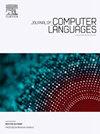探测和处理极限串事件
IF 1.8
3区 计算机科学
Q3 COMPUTER SCIENCE, SOFTWARE ENGINEERING
引用次数: 0
摘要
字符串事件是出现在字符流中的一种模式。在许多情况下,都需要检测和处理无限文本中的字符串事件,包括在线处理日志、网络爬行和语法高亮。本文介绍了一种指定和处理字符串事件的技术。用户通过标记语言确定感兴趣的模式。根据这些示例,通过正则表达式的半晶格对标记进行概括。这些标记被组合成一种无语境语言,可识别文本流中的模式。这些技术在一个名为 Lushu 的文本处理系统中得以实现,该系统在 Java 虚拟机(JVM)上运行。Lushu 拦截 JVM 发出的字符串。一旦检测到模式,它就会调用用户指定的动作处理程序。作为概念验证,本文展示了 Lushu 在内存消耗和运行时间方面优于 Comby、BeautifulSoup4 和 ZheFuscator 等最先进的解析器和解析器生成器。本文章由计算机程序翻译,如有差异,请以英文原文为准。
Detection and treatment of string events in the limit
A string event is a pattern that occurs in a stream of characters. The need to detect and handle string events in infinite texts emerges in many scenarios, including online treatment of logs, web crawling, and syntax highlighting. This paper describes a technique to specify and treat string events. Users determine patterns of interest via a markup language. From such examples, tokens are generalized via a semi-lattice of regular expressions. Such tokens are combined into a context-free language that recognizes patterns in the text stream. These techniques are implemented in a text processing system called Lushu, which runs on the Java Virtual Machine (JVM). Lushu intercepts strings emitted by the JVM. Once patterns are detected, it invokes a user-specified action handler. As a proof of concept, this paper shows that Lushu outperforms state-of-the-art parsers and parser generators, such as Comby, BeautifulSoup4 and ZheFuscator, in terms of memory consumption and running time.
求助全文
通过发布文献求助,成功后即可免费获取论文全文。
去求助
来源期刊

Journal of Computer Languages
Computer Science-Computer Networks and Communications
CiteScore
5.00
自引率
13.60%
发文量
36
 求助内容:
求助内容: 应助结果提醒方式:
应助结果提醒方式:


